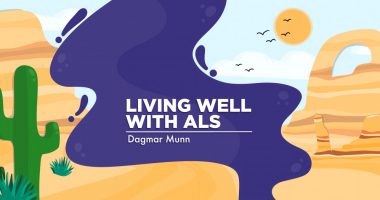How Being ‘Stuck in the Middle’ Turned Into a Blessing in Disguise

“Well I don’t know why I came here tonight,
I’ve got the feeling that something ain’t right.
I’m so scared in case I fall off my chair,
And I’m wondering how I’ll get down the stairs.
Clowns to the left of me!
Jokers to the right!
Here I am stuck in the middle with you.”
The saga of the British band Stealers Wheel and their only top 10 song “Stuck in the Middle with You” has powerfully resonated with me in apocalyptic fashion since my ALS diagnosis.
Take the group itself. After the release of their debut album, which contained the aforementioned single, they were touted as “Britain’s answer to Crosby, Stills, Nash and Young.” Inexplicably, it was all downhill from there. As is the case with ALS and me. For reasons unknown, the disease infiltrated my defenses, causing an irrevocable plummet in my performance and potential.
Then there are the lyrics. I have literally fallen off my chair. And back in the day when stair descent was still a risk-reward option, I’d consider the alternatives with chess master-like scrutiny. If there were secure railings, I might chance a solo attempt. Failing that, I could opt for a trailing spotter, with one hand firmly affixed to my clothing. My fallback (the perfect word for ALS!) was the always comical butt slide.
The song’s refrain depicts a flanking throng of mindless fools. Factor in an irrational clown phobia — which I admit to having — and occupying the middle ground can become alarmingly absurdist. Just like ALS.
All that said, the song always leaves me smiling. It speaks to how life may be crushing sometimes, but you’ve got to rise up and keep living it. Even when for brief moments life seems ideal, it’s never actually perfect for anybody. The song is a reminder to take those I hold dearest in my heart and be happy I’m stuck in the middle with them.
November is National Family Caregivers Month. It was designated to pay tribute to the critical role that family caregivers play in the lives of those under their guardianship. Its intent is also to cast a spotlight on just how burdensome and obstacle-laden the task truly is.
I know both sides of that coin all too well. Without the timely intervention of family members, I would have ceased to exist long ago. What existence I’d have mustered would’ve been hellishly barbaric and cruel.
Their toil in the best case is tedious, and in the worst repugnantly loathsome. All their cries for help fall on deaf ears. No remuneration is forthcoming. Yet I am “me” because they are “THEM.”
Care comes in all shapes and sizes and may arrive from any direction. It can originate in remote locations. When I began experiencing the disturbing symptoms that preceded my diagnosis, I was living below the family radar, in virtual radio silence, more than 1,000 miles away from any kinfolk. Miraculously, they found me.
Alarmed by his inability to contact me, my brother Brian flew in from Ireland, and showed up on my doorstep unannounced. His presence bolstered my spirit and helped prepare me for the serpentine journey ahead.
When news of my condition broke, my Aunt Barb and Uncle Ron conducted yeoman research on ALS. They immediately forwarded on their unsugarcoated findings, sprinkled with dashes of hope. They also reminded me that no matter what, I am still a child of God.
My sister Karen implored me to relocate to be near her. She found me a rental, literally within the line of sight of her home. She became my first “hands-on” primary caregiver, checking in often, accompanying me to clinic appointments, performing household chores, running errands, and enlisting her husband, Rick, in a handyman role, as needed. Most importantly, Karen and her family were catalysts in my maturing faith.
The caregiving baton was passed on when I met my bride-to-be, Catherine. Beyond the “blocking and tackling” rigor, she, her parents, Christiane and Christian, and children, Lou-Anne and Max, motivate me to constantly battle ALS. They are emphatic that I never give up. They have been vigilantly on the lookout for anything that may improve my condition.
Over time, my care has steadily grown in complexity, and its fulfillment is ever more onerous. Increasingly, the hands-on element has been delegated to professionals. While physical detachment occurs, emotional relief never follows. My wife remains the caregiving general manager.
This year, the theme of National Family Caregivers Month is “Caregiving Around the Clock.” In my case, 24/7 care is unnecessary. I am more of a liability. I’m liable to truly need, or selfishly want, assistance at any time. And that’s the rub. The baby monitor is never off. Like Mafia vows, ALS family caregiving is “till death do us part.”
The fact is my family is stuck in the middle with me. I, on the other hand, struck it rich with them.
***
Note: ALS News Today is strictly a news and information website about the disease. It does not provide medical advice, diagnosis, or treatment. This content is not intended to be a substitute for professional medical advice, diagnosis, or treatment. Always seek the advice of your physician or other qualified health provider with any questions you may have regarding a medical condition. Never disregard professional medical advice or delay in seeking it because of something you have read on this website. The opinions expressed in this column are not those of ALS News Today or its parent company, BioNews, and are intended to spark discussion about issues pertaining to ALS.








Comments
Mike Minardi
Nice article. Well written, thanks for sharing
David Crellin
I too love this song - used to play and sing it before ALS took away that gift (played guitar since I was 6).
And like you the stair ascent/descent was a challenge. As a former climber I was about to get my climbing harness, carribiner and rope out to set up a belay system. But succombed to a stair lift this Tuesday, provided by Stairlift Express - get the musical pun?
As for why Stealer's Wheel ended: perhaps Gerry Rafferty's demise from liver failure provides a clue.